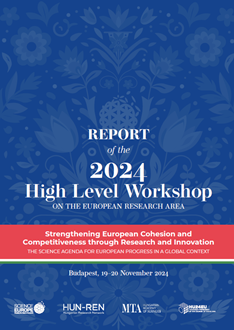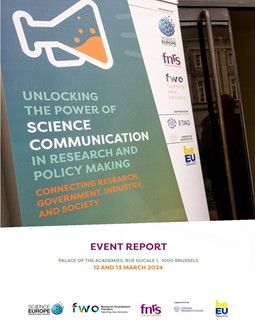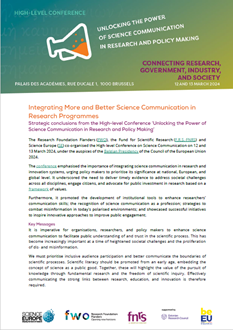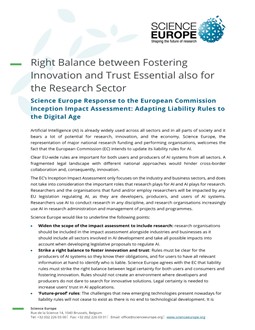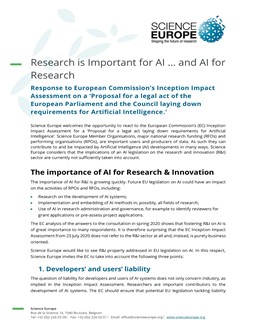Member-only content is available on this page. Please log in to view this content.

Artificial intelligence
Artificial Intelligence (AI) will soon impact almost every aspect of our lives and plays an increasingly important role in research and innovation (R&I). Science Europe believes that any future EU legislation on AI must account for the needs of the research sector.
Why does Artificial Intelligence matter?
AI forms the basis for all computer learning and can significantly improve the way that research is conducted, managed, and published.
Some Science Europe members are already heavily involved in AI developments. They run AI research programmes, fund AI research centres, and manage funding programmes on AI. Some even use it to perform core tasks.
What are the current priorities?
Any future EU legislation on Artificial intelligence will impact researchers and research organisations in many ways, as they are both developers and users of AI systems. AI legislation influences:
- research on the development of AI systems;
- the implementation and embedding of AI methods across all fields of research; and
- the use of AI in research administration and governance, such as the use of AI to identify reviewers for assessment processes.
Artificial Intelligence is also strongly interlinked with Open Science. Researchers have an ever-increasing amount of research data and other digital objects at their disposal. Many researchers already use AI technologies for data analysis. Unbiased datasets and data protocols are needed for researchers to produce quality research. Any future EU legislation on AI therefore needs to complement Open Science policies.
What does research need?
Science Europe strives to ensure that the upcoming EU legislation on AI takes the needs of the research sector into account. The legislation must strike a right balance between providing necessary safety guarantees for both users and developers of AI systems, while creating a legal environment that allows researchers to experiment and develop new applications.
Task Force on Artificial Intelligence
Science Europe currently runs a Task Force on Artificial Intelligence, comprised of members from its various Working Groups. They work together to develop co-ordinated actions related to AI development, legislation, and implementation, providing input from a wide range of research policy areas.
Members
| Name | Working Group | Member Organisation | Country |
|---|---|---|---|
| Oitmaa, Kristel | WG Horizon Europe | Estonian Research Council (ETAG) | Estonia |
| Marjanen, Katja | WG Horizon Europe | Research Council of Finland (AKA) | Finland |
| Ait Ameur, Yamine | WG Greening Research | French National Research Agency (ANR) | France |
| Ochsenfeld-Repp, Sonja | WG Research Culture | German Research Foundation (DFG) | Germany |
| Györffi, Miklós | WG Research Culture | Hungarian Research Network (HUN-REN) | Hungary |
| Verbovszky, Gabriella | WG Greening Research | Hungarian Research Network (HUN-REN) | Hungary |
| Boccali, Tommaso | WG Open Science | National Institute for Nuclear Physics (INFN) | Italy |
| Evensen, Thomas | WG Communication | Research Council of Norway (RCN) | Norway |
| Holm, Jon | WG Research Culture | Research Council of Norway (RCN) | Norway |
| Webb, Sarah | WG Greening Research | UK Research and Innovation (UKRI) | United Kingdom |

Related content
Science Europe Input to the European Commission’s Call for Evidence on A European Strategy for AI in Science
Science Europe has submitted its response to the European Commission’s Call for Evidence on 'A European Strategy for AI in Science', emphasising the need for a forward-looking, values-based strategy that supports innovation and competitiveness in Europe.
Report of the 2024 High Level Workshop on the ERA
This report presents a summary of the dialogue sessions and main conclusions of the 2024 High Level Workshop that took place in Budapest on 19 and 20 November. The event was organised by Science Europe in partnership with the Hungarian Research Network (HUN-REN) and the Hungarian Academy of Sciences (MTA), under the auspices of the Hungarian Presidency of the Council of the European Union.
Report of High-level Conference 'Unlocking the Power of Science Communication in Research and Policy Making'
This report summarises the High-level Conference on Science Communication organised by Science Europe, FWO, and FNRS. The event emphasised the role of science communication, the importance of integrating it into research programmes and policies, and providing support for those engaging in it.
From Ambition To Action: Fostering Research Excellence In Europe - 2023 Annual Report
2023 proved to be another landmark year for Science Europe: building on the achievements of the previous year and setting the direction for new approaches in vital areas of research policy.
Right Balance between Fostering Innovation and Trust Essential also for the Research Sector
Science Europe Response to the European Commission Inception Impact Assessment: Adapting Liability Rules to the Digital Age
Response to the European Commission's Inception Impact Assessment on Artificial Intelligence
In its response to the European Commission, Science Europe highlights that future EU legislation on AI needs to strike the right balance between safeguards for users and developers of AI systems, and a legal environment that fosters R&I.


